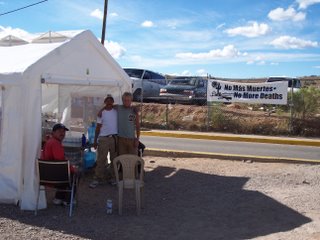Militarization and inhumane treatment at the border

Spending time in Tucson provides one with ample opportunities to experience some wonderful cafes, bookstores, thrift shops and bars, but this experience isn't shared by all who visit southern Arizona. We've attended a number of activist meetings with groups that are working to provide humanitarian aid to the 1,000,000 + people that make a grueling (and often deadly) trek through Mexico and the harsh Sonoran desert in search of a dream of a better life for their families. Many of these groups have placed water stations in the desert in an attempt to save the lives of those attempting this crossing where 2000 men, women and children perished since 1998. Others help by providing aid to those recently deported and documenting abuses by the Border Patrol and others. Yesterday, we joined one such group, No More Deaths, or No mas muertes, and went to the Mariposa (butterfly) border crossing in Nogales, Mexico. This crossing is two miles out of town and used primarily as a NAFTA trucking corridor. This is also where La Migra (mata-suenos) drop off 600"deportees" each day.
We brought a pickup truck full of water bottles and beans to the No More Deaths tent about 50 yards into Mexico. Before long, the first (of many) caminon (bus) came and dropped off about 40 people on the US side and watched as they walked across toward us. We gave them water and bread as they were very thirsty and still had to walk at least 2 miles into town. I talked with many of them, however relatively few due to their numbers, and heard many stories. Groups of young men were describing 6-12 hours of walking in the hot desert before being picked up, detained then deported. They were all planning on trying again immediately.
Many others were living in the states for years with families and jobs. One man was living in Santa Rosa with his American wife and children and went out to walk to the store one day and was arrested and deported (he had a felony on his record for driving without a license, something not available to "undocumented" immigrants). He was just going to the store, unaware he would spend the next week being transferred from prison to prison, Santa Rosa to San Francisco to Sacramento, then on a plane to Idaho, then back to SFO, then to phoenix, then to Los Angeles, then back to San Francisco, then on to Tucson where he was held and then put on a bus and deported a week later. This whole time he was given a pack of cookies or a muffin to eat now and then but "not enough." I was there to greet him in Mexico and was the first to treat him with kindness since he left to go to the store in California. Ironic, as I am a upper-middle class white male from the Bay Area. He borrowed another volunteer's cell phone to call his wife who hadn't heard from him since he went to the store a week ago - I overheard him greet her in English "honey, it's me - I got deported again. I've got no money..."
This type of story was common. One of the volunteers there had been living in the US with his family for 25 years before being deported. Another for 15 years. I met a man who had been working as a janitor in Las Vegas for 6 years before being deported. They all describe inadequate food and water, inability to make phone calls, the border patrol cutting up their ID cards and green cards, as well as long detentions.
There were very few women and children - I was told that this was because the border patrol has begun dropping them off very late at night at this dangerous NAFTA port where they would be faced with a perilous walk past muggers, rapists and thieves into town to try and find a shelter for the night. This was in the name of "deterrence."
All who passed gratefully took the water as I noticed their lack of shoe laces and asked them if they were okay, if they had been mistreated or had blisters on their feet.
With all the very clear obstacles in their path, the 20 foot high steel border fence, the National Guard, Border Patrol, minutemen, the extreme climate of the desert, the expensive smuggling, the possibility of being raped, beaten and robbed, the possibility of deportation, every one of those 600 people would likely try to cross again the next day or sooner.
The fact that this was not the downtown Nogales crossing, but the NAFTA trucking corridor was deeply ironic to me. It is the influence of neo-liberal economics, NAFTA and now CAFTA that is impoverishing Mexico and Central America and creating the situation where 1 million Mexicans and 200,000 Central Americans will try to emigrate this year.
The answer to all these problems that go along with immigration (gangs that prey on immigrants, low wages at home and abroad, billions of dollars going toward trying to control the situation, human rights abuses...) does not include the constantly increasing militarization of the border. This will not stop the human waves of people dreaming of a better life in the US, but will only cause more death and suffering, when it comes to the border (and everywhere else) increased militarization = more death.
Groups supporting immigrants rights and lives at the border
No more deaths/no mas muertes
Humane Borders

1 Comments:
Free trade without free movement of people (aka labor) is a farce. The WTO, NAFTA, CAFTA, etc. serve the interests of huge corporations that concentrate wealth (and export it).
3:48 PM
Post a Comment
Subscribe to Post Comments [Atom]
<< Home